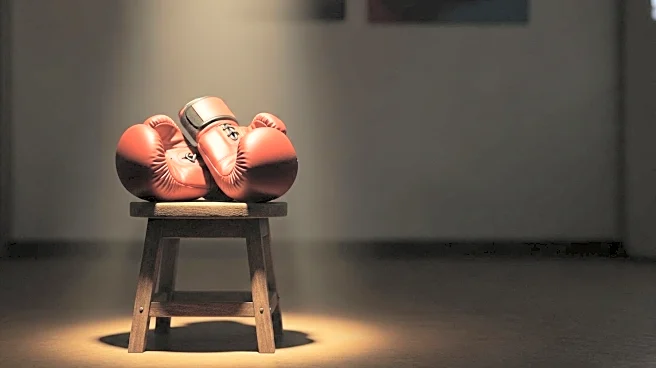What's Happening?
Ricky Hatton, a former world boxing champion known for his popularity and success in the sport, has been found dead at his home in Greater Manchester, England, at the age of 46. The Greater Manchester Police reported that they were called to Hatton's residence early Sunday morning, where they discovered his body. Authorities have stated that there are no suspicious circumstances surrounding his death. Hatton, who was a beloved figure in the boxing community, had recently announced a return to the ring for a professional bout in December, marking his first fight since 2012. Throughout his career, Hatton won world titles in the light welterweight and welterweight divisions and fought against some of the sport's greatest, including Floyd Mayweather and Manny Pacquiao. His passing has prompted tributes from fellow boxers and fans, highlighting his impact both inside and outside the ring.
Why It's Important?
Ricky Hatton's death marks the loss of a significant figure in the boxing world, known not only for his achievements in the ring but also for his influence on the sport and its fans. Hatton's career was characterized by his all-action style and his ability to draw large crowds, particularly from the UK, to his fights. His openness about mental health struggles post-retirement has also been a point of discussion, shedding light on the challenges athletes face beyond their professional careers. Hatton's legacy extends beyond his titles, as he inspired a generation of boxers and fans, making his passing a moment of reflection on the pressures and triumphs of professional sports.
What's Next?
In the wake of Hatton's death, the boxing community and his fans are likely to continue honoring his legacy through tributes and memorials. Manchester City, a club Hatton supported, has announced a minute of appreciation during their upcoming match. The impact of Hatton's openness about mental health may also prompt further discussions and initiatives within the sports community to support athletes facing similar challenges. As the boxing world mourns, there may be increased focus on the well-being of retired athletes and the support systems available to them.
Beyond the Headlines
Ricky Hatton's life and career highlight the complex interplay between sports success and personal well-being. His candidness about mental health issues challenges the stigma often associated with such struggles, particularly in the high-pressure world of professional sports. Hatton's story underscores the importance of addressing mental health openly and the need for comprehensive support for athletes transitioning out of their careers. His legacy may inspire further advocacy and awareness efforts, contributing to a broader cultural shift in how mental health is perceived and addressed in sports.










